Meta Reports Modest AI Impact on Global Elections Amid Concerns
Meta has reported a modest impact of AI on global elections in 2024, citing successful defenses against AI-driven misinformation. Nick Clegg emphasized the company’s proactive measures and monitoring operations, leading to the disruption of covert influence campaigns. Despite public concerns and skepticism about AI, particularly on other platforms, Meta highlighted the overall low volume of AI-generated misinformation during the election cycle.
Meta Platforms, Inc. has reported that artificial intelligence (AI) had a “modest” impact on global elections in 2024, defying widespread concerns regarding its potential influence. Nick Clegg, the president of global affairs at Meta, indicated that the company’s defensive measures successfully intercepted AI-driven misinformation campaigns across their platforms, including Facebook, Instagram, and Threads. Clegg described the use of generative AI by those spreading misinformation as generally ineffective at circumventing Meta’s monitoring systems.
In its monitoring efforts, Meta operated multiple election operations centers worldwide, overseeing major elections in countries such as the United States, France, India, and Brazil. The company noted that it dismantled approximately 20 covert influence operations this year, with Russia being the predominant source of such activities. The overall presence of AI-generated misinformation was described as low, with Meta efficiently managing to label or remove such content in a timely manner.
Despite the significant global electoral activity and the associated apprehensions about AI’s role, Clegg reassured that any influence was limited. He emphasized that AI-generated content, including deepfakes, was swiftly identified and revealed as false. However, Clegg acknowledged reports of problematic AI-generated content on other platforms, such as TikTok.
Public sentiment surrounding AI’s role in elections remains skeptical. A Pew survey revealed that significantly more people anticipated predominantly harmful uses of AI in the electoral process compared to those who expected beneficial applications. Furthermore, Meta has faced scrutiny over its content moderation policies, particularly amidst allegations of censorship related to political viewpoints. While seeking to enhance the integrity of electoral discourse on its platforms, Meta strives to balance this with allowing user engagement regarding electoral concerns.
Republican lawmakers have voiced apprehensions about perceived censorship on social media, with Meta’s CEO, Mark Zuckerberg, expressing regret for certain content removal decisions made under external pressures. Clegg mentioned Zuckerberg’s desire to engage constructively with the incoming administration on tech policy, aiming at bolstering America’s leading position in innovative fields, particularly AI.
In recent years, the discourse surrounding artificial intelligence (AI) has intensified, especially regarding its potential impact on political processes. As social media platforms like Meta have become primary channels for information dissemination, concerns over misinformation campaigns using advanced AI technologies have proved pivotal in shaping public and political responses. The 2024 election cycle represented a significant global engagement, prompting Meta to implement extensive monitoring measures. Mark Zuckerberg’s leadership and ongoing discussions about content moderation policies have further highlighted the challenges faced by tech companies in maintaining a balance between free speech and preventing the spread of misinformation.
In conclusion, while fears of AI’s influence on the electoral process were prominent, Meta’s assessment indicates that any such impact was minor and effectively managed through proactive measures. The company’s focus on monitoring and mitigating AI-driven misinformation reflects a commitment to electoral integrity amidst evolving digital communication landscapes. Nevertheless, public skepticism regarding AI’s role remains a critical consideration, warranting continued vigilance and adaptability in content moderation and platform policies to safeguard democratic processes.
Original Source: www.aljazeera.com




Post Comment